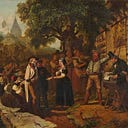Member-only story
Amid Quest For Neo-Ottomanism, Turkish Diplomacy Veers off Republican Realism (III)
Turkey’s diplomacy seems to have veered off Ataturk’s famous postulate of “Peace at Home, Peace Abroad” to “War at Home, War Abroad.”
Historical Perspective
Diplomacy in the Ottoman-Republican Continuum
“We were all trained by the knowledge that the Ottoman-Republican foreign policy tradition had been deeply rooted in a set of unflinching principles and a strong foundation. We know that the Ottoman and Republican-era diplomats played very important roles in state affairs. The Ottoman diplomatic elites, during the long 19th century, had to strike a very delicate balancing act to prevent the demise of the empire,” the former diplomat Yasir Gokce says.
Reflecting a shared conventional wisdom among scholars, Gokce, a young career diplomat who had been dismissed by the Turkish government in late 2016 during emergency rule, argues that those balancing policies were instrumental in prolonging the life of a decaying empire in the 19th century in the face of multiple security and geopolitical challenges in the Balkans, in the Middle East and in the Mediterranean as Great Powers of the era were occupied by the vexing Eastern Question…
